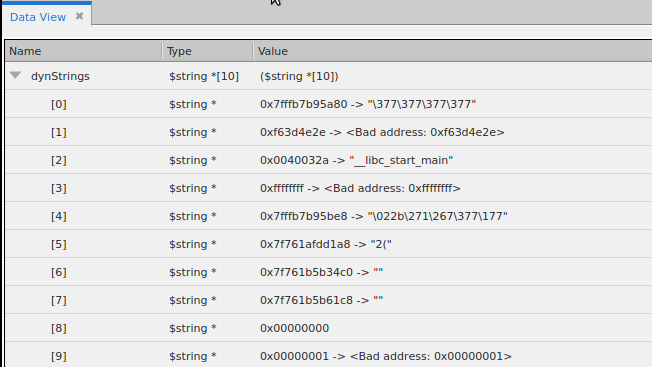Cast a variable into an array by adding an array specifier to the Type declaration. For example, adding [3] to a variable declared as an int changes it into an array of three ints.





Type String | Language | Size | Description |
$address | C | void* | Void pointer (address). |
$char | C | char | Character. |
$character | Fortran | character | Character. |
$code | C | architecture-dependent | Machine instructions.The size used is the number of bytes required to hold the shortest instruction for your computer. |
$complex | Fortran | complex | Single-precision floating-point complex number.Thecomplex types contain a real part and an imaginary part, which are both of type real. |
$complex_8 | Fortran | complex*8 | Areal*4-precision floating-point complex number.Thecomplex*8 types contain a real part and an imaginary part, which are both of type real*4. |
$complex_16 | Fortran | complex*16 | Areal*8-precision floating-point complex number.Thecomplex*16 types contain a real part and an imaginary part, which are both of type real*8. |
$double | C | double | Double-precision floating-point number. |
$double_precision | Fortran | double precision | Double-precision floating-point number. |
$extended | C | architecture-dependent;oftenlong double | Extended-precision floating-point number. Extended-precision numbers must be supported by the target architecture. In addition, the format of extended floating point numbers varies depending on where it's stored. For example, the x86 register has a special 10-byte format, which is different than the in-memory format. Consult your vendor’s architecture documentation for more information. |
$float | C | float | Single-precision floating-point number. |
$int | C | int | Integer. |
$integer | Fortran | integer | Integer. |
$integer_1 | Fortran | integer*1 | One-byte integer. |
$integer_2 | Fortran | integer*2 | Two-byte integer. |
$integer_4 | Fortran | integer*4 | Four-byte integer. |
$integer_8 | Fortran | integer*8 | Eight-byte integer. |
$logical | Fortran | logical | Logical. |
$logical_1 | Fortran | logical*1 | One-byte logical. |
$logical_2 | Fortran | logical*2 | Two-byte logical. |
$logical_4 | Fortran | logical*4 | Four-byte logical. |
$logical_8 | Fortran | logical*8 | Eight-byte logical. |
$long | C | long | Long integer. |
$long_long | C | long long | Long long integer. |
$real | Fortran | real | Single-precision floating-point number.When using a value such as real, be careful that the actual data type used by your computer is not real*4 or real*8, since different results can occur. |
$real_4 | Fortran | real*4 | Four-byte floating-point number. |
$real_8 | Fortran | real*8 | Eight-byte floating-point number. |
$real_16 | Fortran | real*16 | Sixteen-byte floating-point number. |
$short | C | short | Short integer. |
$string | C | char | Array of characters. |
$void | C | long | Area of memory. |
$wchar | C | platform-specific | Platform-specific wide character used by wchar_tdata types |
$wchar_s16 | C | 16 bits | Wide character whose storage is signed 16 bits (not currently used by any platform) |
$wchar_u16 | C | 16 bits | Wide character whose storage is unsigned 16 bits |
$wchar_s32 | C | 32 bits | Wide character whose storage is signed 32 bits |
$wchar_u32 | C | 32 bits | Wide character whose storage is unsigned 32 bits |
$wstring | C | platform-specific | Platform-specific string composed of $wchar characters |
$wstring_s16 | C | 16 bits | String composed of $wchar_s16 characters (not currently used by any platform) |
$wstring_u16 | C | 16 bits | String composed of $wchar_u16 characters |
$wstring_s32 | C | 32 bits | String composed of $wchar_s32 characters |
$wstring_u32 | C | 32 bits | String composed of $wchar_u32 characters |